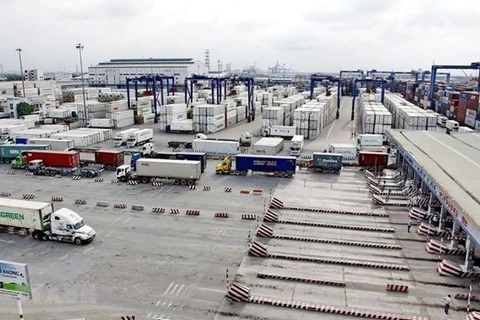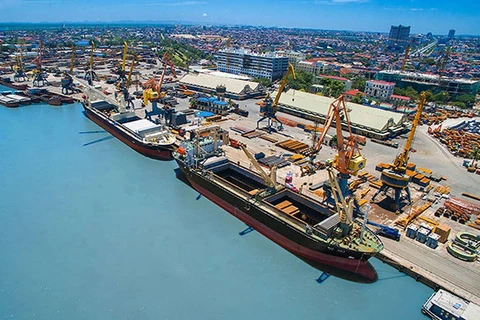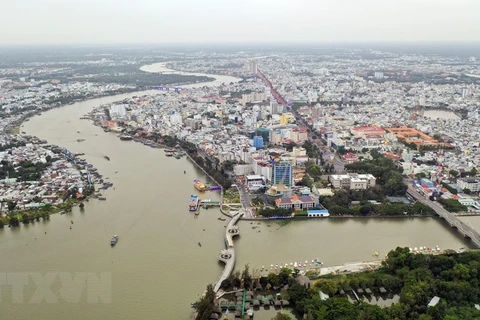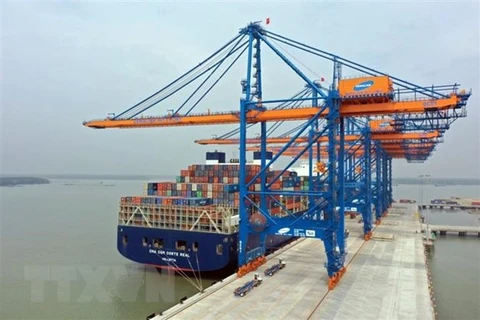Hanoi (VNS/VNA) - Investment in transport infrastructure in the Mekong Delta is key to boosting exports of local agricultural and seafood products, according to experts.
The Mekong Delta has a lot of development potential, especially for agricultural and seafood exports.
However, exports face many difficulties due to scattered transport infrastructure and a lack of links in the transport system, causing high transport costs and affecting competitiveness.
Nguyen Thanh Binh, Chairman of the An Giang Provincial People's Committee, was quoted by the Vietnam News Agency as saying that: "The three bottlenecks of the Mekong Delta region and also the country are in terms of mechanisms, human resources and traffic. Of which, transport is an extremely important factor."
"To develop rice and aquatic production, it is necessary to link the Mekong Delta with other regions through the transport network," Binh said.
According to the Vietnam Chamber of Commerce and Industry (VCCI)'s Can Tho Branch, the Mekong Delta's import and export turnover growth in recent years has slowed.
The exports of the region grew on average 11.8 percent each year in 2010-2018, significantly lower than the national average of 16.4 percent. Provinces depending on export farming products such as An Giang, Ca Mau, Kien Giang, Tra Vinh and Vinh Long have seen decreased export turnover due to limitations in the agricultural processing industry.
Meanwhile, increased export turnover in other localities has mainly depended on the processing industry such as in Long An and Tien Giang, or foreign-invested enterprises in some labour-intensive industries like textiles and footwear.
Nguyen Dinh Tung, General Director of Vina T&T Import and Export Company, said the transport infrastructure in the region had significantly improved recently. This had allowed companies to purchase farming and fruit products directly instead of buying through traders.
However, inter-provincial roads still aren't connected well enough, provincial roads were mostly narrow and the highways connecting the provinces and cities with commercial and logistics service centres in Ho Chi Minh City were just in their first phase of development, he said.
According to Truong Dinh Hoe, General Secretary of the Vietnam Association of Seafood Exporters and Producers (VASEP), the biggest limitation of the Mekong Delta is a lack of a deep water port to ship export goods, as the region is the largest producer and exporter of seafood, fruit and rice nationwide.
At present, all export goods must be taken to transit ports in HCM City and Ba Ria-Vung Tau province.
Transporting cargo to many transit places has added indirect costs, reducing the competitiveness of Vietnam's seafood products compared to other exporting countries.
Empty containers must be transported from HCM City to the Mekong Delta to pack export goods, and then those goods containers must return to ports in HCM City.
According to Hoe, the Government, ministries and sectors have offered solutions and projects to develop transport infrastructure in the region, but the transport infrastructure network has not kept up with the speed of economic development.
According to Tung, the region has many shallow seaports to be transit places for deep water seaports, but these shallow ports have not operated as well as expected.
Enterprises want seaports in the region to be renovated for more efficient operation. If a deep seaport can be built to receive large ships transporting export cargo, it will significantly shorten transportation time and costs.
The development of the transport infrastructure in the Mekong Delta will not only aid exports but also facilitate goods circulation and transport connections between the region and HCM City to attract more investment to Mekong Delta provinces.
Key transport projects
According to the Ministry of Transport, transport infrastructure in the Mekong Delta in 2021-2025 needs about 57 trillion VND (2.5 billion USD) to invest in key projects.
Meanwhile, many key infrastructure projects in the region have been completed to form a new traffic route from Cao Lanh, Dong Thap province to Kien Giang province, including the Cao Lanh bridge, Vam Cong bridge and roads connecting the centre of the Mekong Delta to other regions.
Chairman of Sovico Group Nguyen Thanh Hung has proposed developing the Can Tho aviation logistics centre project in Binh Thuy district, including facilities for logistics services, freight station, distribution centre and aviation support service centre.
At the same time, Can Tho International Airport needs a cargo warehouse to export agricultural products, seafood products and fruits by air, connecting with other logistics warehouses to gather export goods of the region.
Experts say that to solve the problem of transport infrastructure, the State should focus on projects not only in the Mekong Delta but also in HCM City to help remove bottlenecks in the domestic logistics system.
The VCCI has recommended that specific solutions in regional co-operation, urban planning and infrastructure development should be put in a unified strategy.
At the same time, the State should prioritise consolidating the regional transport system, especially roads on the North-South and East-West routes, including the HCM City - Can Tho - Ca Mau route and the Soc Trang - Can Tho - Chau Doc route.
Minister of Transport Nguyen Van The said by the end of 2021, the Trung Luong - My Thuan expressway would be put into operation and the My Thuan 2 bridge would be completed in 2023. Meanwhile, the My Thuan - Can Tho expressway would be completed in 2022. Thus, the route from HCM City to Can Tho would be a factor to boost the development of the region.
In addition, there are a number of projects, such as the construction of the Ca Mau - Can Tho expressway and the Chau Doc - Long Xuyen - Can Tho expressway. Especially, the project of building the road from Soc Trang to the Tran De Port is under the process of getting approval on investment policy and it is expected to complete the first phase of the project in 2025./.
The Mekong Delta has a lot of development potential, especially for agricultural and seafood exports.
However, exports face many difficulties due to scattered transport infrastructure and a lack of links in the transport system, causing high transport costs and affecting competitiveness.
Nguyen Thanh Binh, Chairman of the An Giang Provincial People's Committee, was quoted by the Vietnam News Agency as saying that: "The three bottlenecks of the Mekong Delta region and also the country are in terms of mechanisms, human resources and traffic. Of which, transport is an extremely important factor."
"To develop rice and aquatic production, it is necessary to link the Mekong Delta with other regions through the transport network," Binh said.
According to the Vietnam Chamber of Commerce and Industry (VCCI)'s Can Tho Branch, the Mekong Delta's import and export turnover growth in recent years has slowed.
The exports of the region grew on average 11.8 percent each year in 2010-2018, significantly lower than the national average of 16.4 percent. Provinces depending on export farming products such as An Giang, Ca Mau, Kien Giang, Tra Vinh and Vinh Long have seen decreased export turnover due to limitations in the agricultural processing industry.
Meanwhile, increased export turnover in other localities has mainly depended on the processing industry such as in Long An and Tien Giang, or foreign-invested enterprises in some labour-intensive industries like textiles and footwear.
Nguyen Dinh Tung, General Director of Vina T&T Import and Export Company, said the transport infrastructure in the region had significantly improved recently. This had allowed companies to purchase farming and fruit products directly instead of buying through traders.
However, inter-provincial roads still aren't connected well enough, provincial roads were mostly narrow and the highways connecting the provinces and cities with commercial and logistics service centres in Ho Chi Minh City were just in their first phase of development, he said.
According to Truong Dinh Hoe, General Secretary of the Vietnam Association of Seafood Exporters and Producers (VASEP), the biggest limitation of the Mekong Delta is a lack of a deep water port to ship export goods, as the region is the largest producer and exporter of seafood, fruit and rice nationwide.
At present, all export goods must be taken to transit ports in HCM City and Ba Ria-Vung Tau province.
Transporting cargo to many transit places has added indirect costs, reducing the competitiveness of Vietnam's seafood products compared to other exporting countries.
Empty containers must be transported from HCM City to the Mekong Delta to pack export goods, and then those goods containers must return to ports in HCM City.
According to Hoe, the Government, ministries and sectors have offered solutions and projects to develop transport infrastructure in the region, but the transport infrastructure network has not kept up with the speed of economic development.
According to Tung, the region has many shallow seaports to be transit places for deep water seaports, but these shallow ports have not operated as well as expected.
Enterprises want seaports in the region to be renovated for more efficient operation. If a deep seaport can be built to receive large ships transporting export cargo, it will significantly shorten transportation time and costs.
The development of the transport infrastructure in the Mekong Delta will not only aid exports but also facilitate goods circulation and transport connections between the region and HCM City to attract more investment to Mekong Delta provinces.
Key transport projects
According to the Ministry of Transport, transport infrastructure in the Mekong Delta in 2021-2025 needs about 57 trillion VND (2.5 billion USD) to invest in key projects.
Meanwhile, many key infrastructure projects in the region have been completed to form a new traffic route from Cao Lanh, Dong Thap province to Kien Giang province, including the Cao Lanh bridge, Vam Cong bridge and roads connecting the centre of the Mekong Delta to other regions.
Chairman of Sovico Group Nguyen Thanh Hung has proposed developing the Can Tho aviation logistics centre project in Binh Thuy district, including facilities for logistics services, freight station, distribution centre and aviation support service centre.
At the same time, Can Tho International Airport needs a cargo warehouse to export agricultural products, seafood products and fruits by air, connecting with other logistics warehouses to gather export goods of the region.
Experts say that to solve the problem of transport infrastructure, the State should focus on projects not only in the Mekong Delta but also in HCM City to help remove bottlenecks in the domestic logistics system.
The VCCI has recommended that specific solutions in regional co-operation, urban planning and infrastructure development should be put in a unified strategy.
At the same time, the State should prioritise consolidating the regional transport system, especially roads on the North-South and East-West routes, including the HCM City - Can Tho - Ca Mau route and the Soc Trang - Can Tho - Chau Doc route.
Minister of Transport Nguyen Van The said by the end of 2021, the Trung Luong - My Thuan expressway would be put into operation and the My Thuan 2 bridge would be completed in 2023. Meanwhile, the My Thuan - Can Tho expressway would be completed in 2022. Thus, the route from HCM City to Can Tho would be a factor to boost the development of the region.
In addition, there are a number of projects, such as the construction of the Ca Mau - Can Tho expressway and the Chau Doc - Long Xuyen - Can Tho expressway. Especially, the project of building the road from Soc Trang to the Tran De Port is under the process of getting approval on investment policy and it is expected to complete the first phase of the project in 2025./.
VNA
























